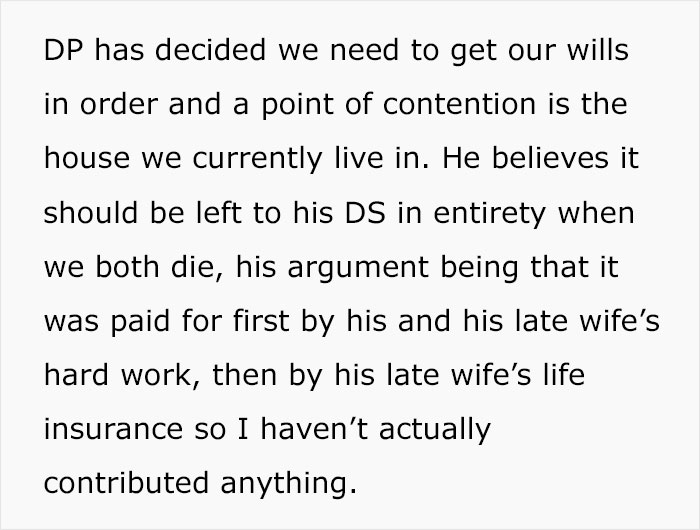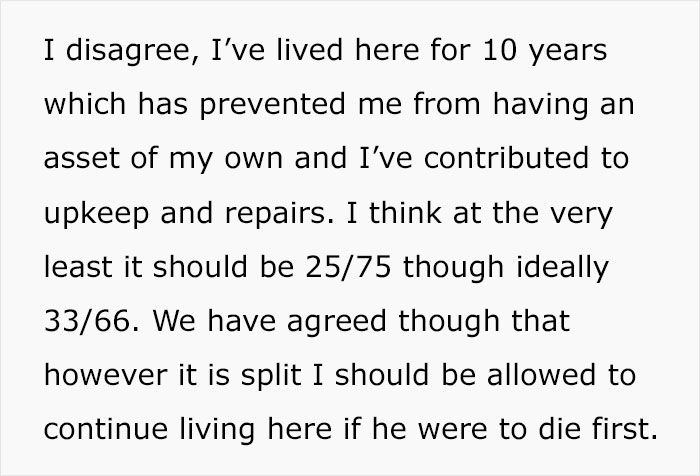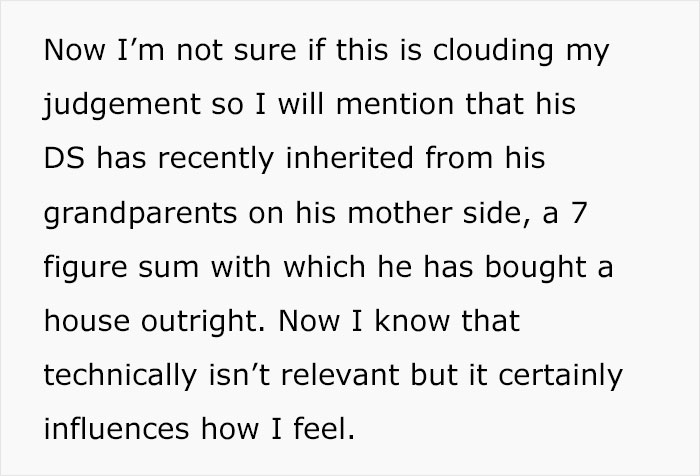The question of what people should do with your belongings once you’re gone is as old as humanity itself. For a long time, possessions were passed from generation to generation. Perhaps, that was an easier way to do it.
Today’s story covers a woman and her partner’s dispute, who reached out to the internet for advice regarding inheritance. The lady thought that since she had lived with her partner for over 10 years in the same house, she must be entitled to partly owning the property and including it in her will. However, the man thinks otherwise, leaving the couple in a sticky situation.
More Info: Mumsnet
More often than not, inheritance and family drama go hand in hand

Image credits: Drazen Zigic (not the actual photo)
A woman approached an online forum, asking for advice to settle an inheritance dispute between her and her partner




Image credits: wirestock (not the actual photo)
The woman claims she’s entitled to the man’s house, although she didn’t contribute to it financially, but lived in it for 10 years and helped with upkeeping the house




Image credits: Curtis Adams (not the actual photo)
The man pushed back on this, claiming that he and his late wife paid for the house in its entirety, thus it should be left to his offspring, and not his current partner



After the lady’s partner pushed back, she sought advice online to check if her request was unreasonable, and many netizens sided with her partner
Recently, a woman approached the Mumsnet community for advice. The OP (Original Poster) had a dispute with her partner, with whom she’s already over 10 years in a relationship with. The couple met each other after both of them were already divorced from their previous partners, and since then decided to not re-marry. Both the man and the woman have adult children, 28 and 27 years old respectively.
The argument between the partners unfolded as they were talking about inheritance and writing their wills. The man believes that the house they’re living in should be left in its entirety to his son. The reasoning behind his argument is that the house was paid off by his and his late wife’s hard work. A part of the mortgage was paid by the wife’s life insurance as well. So in terms of mortgage, the current partner didn’t contribute at all.
However, this argument didn’t come across well to the woman. OP’s rebuttal is that the house should at least be split 25/75, or ideally 33/66. Her point is that she indeed contributed financially over the 10-year period they were living in the house, as she helped to upkeep it and paid for repairs.
Moreover, the lady couldn’t get an asset of her own, since those costs prevented her from doing so. The man pushed back on this, but they did agree upon one thing – if the man were to pass away first, the woman would still be able to keep living in the house.

Image credits: pressfoto (not the actual photo)
The man further explained that life insurance, or pensions, should go to their respective children and the woman also agreed with this. Here’s the catch though – the woman admitted that there was one thing “clouding” her judgment. The man’s son recently inherited 7 figures, which he used to purchase a house immediately. In her own words, “I know that technically isn’t relevant but it certainly influences how I feel.”
The lady’s dispute is a good example of why wills and discussions of inheritance should be held. It’s not an accident that wills in current times are protected and enforced by law. Testaments help to streamline the process and ensure that the subject’s interests are protected even after passing. However, leaving a will can be quite nuanced and difficult, especially if two parties are involved in the decision-making.
Interestingly, estimates show that 45% of people over the age of 55 have a will, and 81% of people over the age of 72. Some say that getting a will is never too early, others say that a testament should be written when you first start a family or have kids. Either way, a will is something that everyone should write at some point in their life. It’s a good opportunity to do something good for the world too even after you’re gone – 1 in 4 wills include a gift to a charitable organization. Now back to the story!
At the end of her post, the woman asks an open question to the people of the Internet – is she being unreasonable or not?
According to the vast majority ( 76 % out of 2547 votes), people mostly sided with the man. They argue that the man and his late wife paid for the house fully, also the woman mentioned in her post that she couldn’t take out a mortgage anyway when she was living alone after her divorce. Either way, she would’ve paid rent or could try saving up and buying an asset whilst living with her current partner.
What would you do in these circumstances? Do you think the woman deserves a third of the house? Should the house be split between unrelated offspring of the two partners in their will? Let us know in the comments below.
People online disagree with the woman and say that the man is right

















